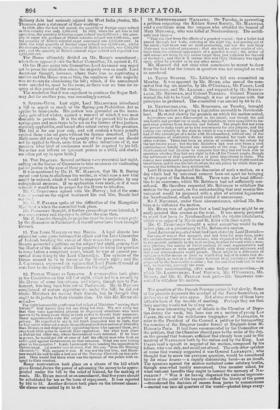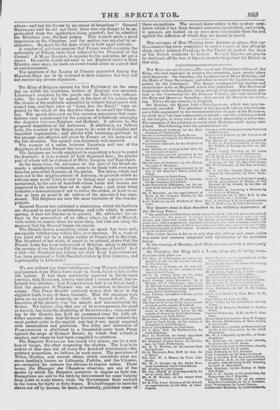The question of the French Peerage proceeds but slowly. Some
of the journals deprecate the conduct of the Peers themselves, as destructive of their own cause. Not above seventy of them have hitherto been at the trouble of meeting. Perhaps they see that their meeting would not be of any use.
The most interesting topic of debate in the Chamber of Depu- ties during the week, has been one on a motion of young LAS CASES, the son of the well-known biographer of NAPOLEON, to refer to the President of the Council a petition for transporting the remains of the Emperor (under favour of England) from St. Helena to Paris. It had been recommended by the Committee on the petition, that the Chamber should pass to the order of the day, on the ground that honours sufficient had already been paid to the memory of NAPOLEON both by the nation and by the King. LAS CASES read a speech in support of his motion, composed by his father, who was sick, and could not attend. The only other speaker of name that warmly supported it was General LA.MARQUE ; who thought that to move the previous question, would be considered by lee vieux braves — a rapidly diminishing band—as an insult. The speeches against the motion contained some salutary truths, though somewhat tardily announced. One member asked, for what national benefits they ought to honour the memory of NA- POLEON.? " Was it for having dispersed the national represen- tatives at the point of the bayonet—stifled the liberty of the press —transferred the decision of causes from juries to commissions —carried war into all. quarters of the world—planted kings every- where—and lost his throne by an excess of despotism ?" General BERTRAND said he did not think there was any danger to be ap- prehended from the application being granted ; but he admitted the Ministers were the best judges. This remark made a great impression on the Chamber, and the motion was rejected by ac. clamation. So much for the fame which is built upon violence.
A number of petitions praying that France would recognize the nationality of Poland, have been referred to the President of the Council. A M. DE BIGNON, in arguing for the reference, let out a secret. He said he would not care to see England under a Tory Ministry once more, for such an event would cause us a great deal of embarrassment.
The members of the Legion of Honour appointed during the Hundred Days are to be restored to their honours, but they will not receive any arrears of pension.



























 Previous page
Previous page